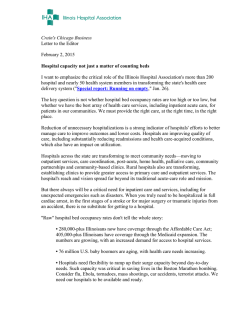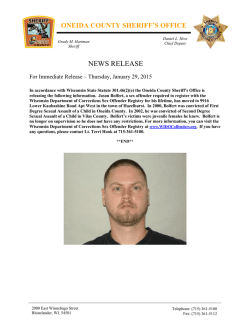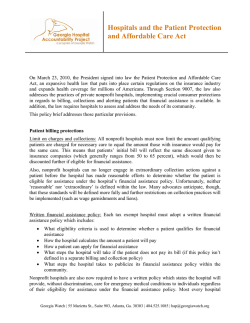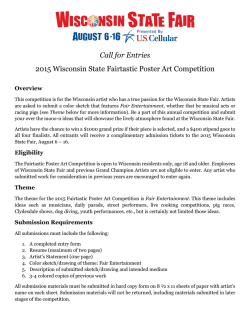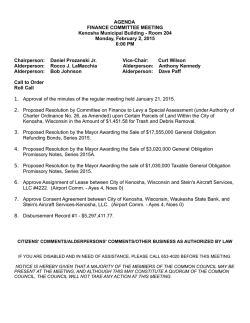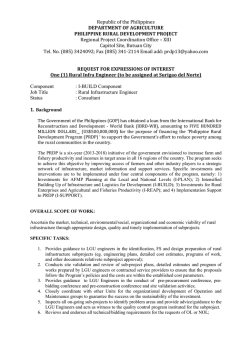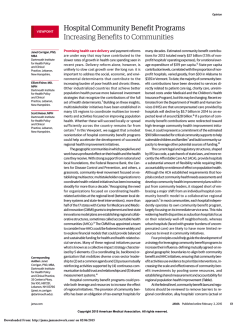
The Valued Voice -- pdf - Wisconsin Hospital Association
January 30, 2015 Volume 59, Issue 4 WHA Praises Governor for Including Medicaid DSH Program in State Budget The Wisconsin Hospital Association praised Gov. Scott Walker on January 28 for including the reauthorization of the Disproportionate Share Hospital (DSH) program in the budget he will submit to the state Legislature February 3. The Governor proposes to fund the program at its full amount ($30 million GPR) for the 2015-2017 biennium. “We are very pleased that Governor Walker continues to recognize how critically important hospitals are to ensuring access to care for all Wisconsinites, including the growing number of Medicaid patients,” said WHA President/CEO Eric Borgerding. “This is welcome, ongoing acknowledgment of the challenges that confront Wisconsin’s Gov. Scott Walker hospitals, where care is provided to all who walk through their doors, every minute of every day of every year.” The DSH program was created in the 2013-15 budget to improve Medicaid reimbursement and help those hospitals that serve a large number of Medicaid patients. The DSH program was slated to end on June 30, 2015. If not reauthorized, hospitals could see a $75 million (all funds) reduction in already inadequate reimbursement beginning July 1. Wisconsin’s Medicaid program, also known as BadgerCare, reimburses hospitals just 65 percent of what it costs to care for Medicaid patients. In 2013, the shortfall between the cost to care for Medicaid (continued on page 5) Don’t Miss WHA’s Premier Event: 2015 Advocacy Day, April 28 The numbers don’t lie… 900….. Advocacy Day attendees 500+…. Legislative meetings in the Capitol 1 …. Unified hospital voice These numbers are part of the reason you won’t want to miss WHA Advocacy Day 2015 on April 28. Join peers from hospitals across the state for a day of learning and leading on important health care issues. Advocacy Day is one of the best ways your hospital employees, trustees and volunteers can make an important, visible impact in the State Capitol. The Legislature will be in the thick of determining the state’s biennial budget bill, which means Advocacy Day attendees have the opportunity to meet personally with their legislators or legislative staff to discuss important issues such as Medicaid. Advocacy Day 2015 morning keynote will be Tucker Carlson, a nationally-known veteran journalist and political commentator who will share an insider’s view on Washington, D.C. and a look ahead to the 2016 elections. Luncheon keynote will be Gov. Scott Walker (invited) and a legislator panel discussion will round out the morning sessions. (continued on page 2) Board Chair: Therese Pandl, President/CEO, HSHS Eastern WI Division Editor: Mary Kay Grasmick, VP Communications - [email protected] 5510 Research Park Drive P.O. Box 259038 Madison, WI 53725-9038 P (608.274.1820) F (608.274.8554) www.wha.org Continued from page 1 . . . Don’t Miss WHA’s Premier Event: 2015 Advocacy Day, April 28 Attendees will have an issues briefing before heading to the State Capitol for their scheduled legislative meetings. Our goal? Advocating for policies that keep Wisconsin hospitals and health systems strong so they can continue to provide high-quality, high-value care. Make sure you are assembling your hospital contingent for 2015 Advocacy Day set for April 28 at the Monona Terrace in Madison. Registration is now open at: http://events.signup4. net/15AdvocacyDay0428. The brochure is available at www.wha.org/Data/Sites/1/ education/2015AdvocacyDay.pdf. For Advocacy Day questions, contact Jenny Boese at 608-268-1816 or [email protected]. For registration questions, contact Jenna Hanson at [email protected] or 608-274-1820. Grassroots Spotlight Sen. Howard Marklein Meets With Local Hospital Leaders State Sen. Howard Marklein met with hospital leaders from across his district, the 17th Senate District, during a roundtable discussion hosted at Reedsburg Area Medical Center. The roundtable discussion was an opportunity for him to hear directly from rural hospital leaders about legislative issues on the horizon. The group had in-depth discussions about how inadequate Medicaid reimbursement for hospitals creates a “hidden health care tax” on Wisconsin employers who provide insurance coverage to their employees. The group discussed how the state Legislature could help address this hidden health care tax by renewing and improving the Medicaid Disproportionate Share Hospital (DSH) program. In addition to leaders from Reedsburg Area Medical Center, hospital leaders from Grant Regional Health Center (Lancaster), Monroe Clinic (Monroe), and Mile Bluff Medical Center (Mauston) participated in this meeting. Sen. Marklein, seated, second from right. The Valued Voice -- Page 2 -- 1/30/15 Guest Column Working to Fight Cuts to Critical Access Hospitals By Sean Duffy, U.S. Congressman, 7th District A typical weekday at home in Wisconsin starts with getting the kids to school. On a clear day, it’s about a 15-minute drive. Add a fresh batch of snow over a layer of ice, and it could take upwards of a half an hour to make this simple trip. The kids arriving late to school is not the end of the world, but for someone trying to make their way to the hospital for a serious health concern, they may not have those extra minutes to spare. For the last few years, the President has proposed cuts to rural hospitals that would be detrimental to our small communities. Specifically, since FY 2013, U.S. Rep. Sean Duffy the President has included in his budget, cuts to reimbursement rates for critical access hospitals (CAHs) and eliminated the critical access designation for any CAH within 10 miles of another hospital. For rural areas that depend on their critical access hospital, this would cut off access to emergency care services. Rural hospitals must continue providing 24-hour access to care for communities that have no other option. Because of the unique financial situations these hospitals face, some have been forced to close their doors. Since the beginning of 2013, 24 rural hospitals have closed. I will do everything I can in Congress to ensure our hospitals are not included in this statistic. Reducing CAH funding only exacerbates the current problems and will lead to further care shortages in our remote areas. Part of the problem is Washington bureaucrats who have never been to rural America are making these decisions. Ten miles in Washington, D.C. is a quick ride on the Metro Rail system. Ten miles in Wisconsin in January after a heavy snowfall or during icy conditions could mean the difference between life and death. The 114th Congress is underway. My job as the representative of the 7th District is to bring awareness to Washington about challenges that you face in places like Ladysmith and Eagle River. Last year, I held a meeting with hospital leaders from around the state. The Health and Human Services (HHS) regional director for Wisconsin was only able to join us by video conference. I don’t believe she was able to fully experience rural Wisconsin from an office in Chicago. This year, I will work to get staff from HHS on the ground in the 7th District. Until these Washington residents drive 10 miles on our roads, they will never understand. I will continue to work for our hospitals, and I ask that you continue to work with me by keeping me up to date on what you are seeing at your facility. Please let me know next time you make it to D.C., and I look forward to visiting some of you at your care facilities soon. National Rural Residency Group to Meet in Madison The Wisconsin Rural Physicians Residency Assistance Program (WRPRAP) will be hosting the annual national meeting of the Rural Residency Training Track Collaborative May 27-29, 2015 in Madison/ Baraboo. The meeting will focus on rural graduate medical education challenges and strategies for success including sustainability. Lessons learned in Wisconsin focused on the successful RRT in Baraboo, will be highlighted. The agenda includes speakers from several Wisconsin hospitals and health systems, including: Andy Anderson, MD and John Brill, MD from Aurora Health Care; Sandy Anderson, St. Clare Hospital, Baraboo; Mark Thompson, MD, Monroe Clinic; James Damos, MD, and Stu Hannah, MD, Baraboo; Paul Young, MD, Dean Clinics; and Dean Robert Golden and Byron Crouse, MD, UW School of Medicine and Public Health. (continued on page 4) The Valued Voice -- Page 3 -- 1/30/15 Continued from page 3 . . . National Rural Residency Group to Meet in Madison More information about the meeting, including the agenda and registration are at: www.rttcollaborative. net/news.html. CMS Signals 2015 Meaningful Use Rule Flexibility Coming Separate Stage 3 MU rules likely beginning in 2017 On January 29, Patrick Conway, MD, Centers for Medicare & Medicaid Services (CMS) deputy administrator for innovation and quality and CMS chief medical officer, announced that CMS intends to engage in rulemaking to promulgate a new rule this spring to respond to provider concerns about the meaningful use and certified electronic health record (EHR) technology rules regarding software implementation, information exchange readiness and other related concerns in 2015. In the announcement, Conway indicated that CMS is considering proposals to: • Shorten the EHR reporting period in 2015 to 90 days to accommodate these changes. • Realign hospital EHR reporting periods to the calendar year to allow eligible hospitals more time to incorporate 2014 edition software into their workflows and to better align with other CMS quality programs. • Modify other aspects of the program to match long-term goals, reduce complexity, and lessen providers’ reporting burdens. Conway also indicated that such rulemaking would be separate from the “Stage 3” meaningful use proposed rule, which he indicated expects to be released by early March. The announcement also indicated CMS’s intent to limit the scope of the Stage 3 proposed rule to the requirements and criteria for meaningful use in 2017 and subsequent years. The full announcement via CMS’s blog can be found here: http://blog.cms.gov/2015/01/29/cms-intendsto-modify-requirements-for-meaningful-use/. Rural Residency Rotations See 50% Increase in Participation The WHA physician workforce report, “100 New Physicians a Year: An Imperative for Wisconsin,” made a number of recommendations aimed at ensuring the number of physicians practicing in Wisconsin would meet the growing demand for care. Since the release of that report, many initiatives have advanced aimed at expanding the medical school capacity and creating more in-state residency positions. Emphasis has been placed on ensuring there is an adequate supply of physicians to serve rural and inner city areas of the state. An important aspect of the strategy to meet physician needs in rural underserved areas is based on creating opportunities for physicians to complete a clinical rotation in a rural area, and after that, to choose to practice in a rural area of the state. Many efforts have been made to increase the number of rural experiences (rotations) available to physicians in training. A recent survey conducted by the Wisconsin Collaboration for Rural Graduate Medical Education (WCRGME) showed almost a 50 percent increase in the number of residents rotating in their reporting institutions as well as an increase in the total number of weeks that residents spent in rural rotations. While the WCRGME survey focused on family medicine residents, similar rural rotations are being developed in general surgery, psychiatry and pediatrics. “One of the challenges facing expanding both student and resident training in community settings is the recruitment of preceptors,” noted Charles Shabino, MD, WHA chief medical officer. “The 50 percent increase in preceptor participation reported by the WCRGME survey is encouraging.” WHA continues to support physician workforce-related issues. The Valued Voice -- Page 4 -- 1/30/15 Wisconsin Health System Shares ICD-10 Testing Status On January 27, the ICD-10 testing experience of a Wisconsin health system was featured during the weekly national broadcast of Talk Ten Tuesday, a program of ICD10monitor, sponsored by Panacea Healthcare Solutions, Inc. Beth Malchetske, director of business development and integration/ICD-10 program for ThedaCare, reported on the testing experience for their seven hospitals, 40+ clinics, long-term care, and home health involving approximately one million claims per year. Malchetske noted they were very motivated to do end-to-end testing as their transition to the 5010 claim form did not go well. They have been meeting with their clearinghouse, Zirmed, for the past two years to develop and execute their testing plan. They quickly learned each payer has a different approach to testing and that benefit design mattered. ThedaCare uses live payer-appropriate claims data in the testing process which has helped identify errors in the ICD-9 environment too. Malchetske stated, “You need to manage learning that comes from the testing process including why data has to be maintained in a certain manner, and identify what group of resources you need to tap for specific mitigation scenarios.” She further explained each organization is forced to use a small number of claims in the testing process so you have to make some assumptions about larger volumes. Malchetske noted, that when all is said and done there was nothing in the testing process that was not explainable including the financial modeling where they experienced only a small percentage of change. “It was great to hear about a Wisconsin health system on this weekly podcast that routinely has high participation rates,” noted Debbie Rickelman, vice president, WHA Information Center. ThedaCare’s involvement is an example of how Wisconsin health systems are performing their due diligence to prepare for the October 1, 2015 implementation date.” Resources regarding ICD-10 continue to be available on the Wisconsin ICD-10 Partnership website at www.wicd10.org. Continued from page 1 . . . WHA Praises Governor for Including Medicaid DSH Program in State Budget patients in Wisconsin hospitals and the payment hospitals received totaled nearly $1 billion. Those unpaid costs must be recouped from others. (For more information, go to: www.wha.org/medicaidin-the-spotlight.aspx.) “We still have work to do when it comes to improving Wisconsin’s historically inadequate hospital and physician Medicaid reimbursement, and making other reforms to the program, but the announcement by Governor Walker is a very welcome step,” Borgerding said. Gov. Walker’s state budget address will be carried live on Wisconsin Eye (wiseye.org) starting at 6 p.m. on February 3. The Valued Voice -- Page 5 -- 1/30/15
© Copyright 2026

